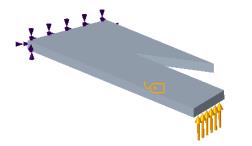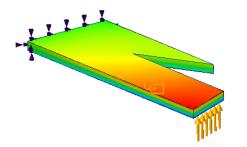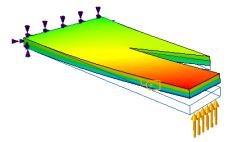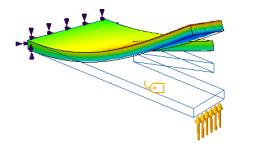Viewing Basic Results
Each time you run a simulation study a set of results for some basic quantities are calculated and can be viewed as soon as the run completes. The following basic results are generated for every simulation study that runs.
|
Simulation Study
|
Basic Results
|
|---|---|
|
Structural simulation study
|
Von Mises Stress
Displacement Magnitude
Displacement X
Displacement Y
Displacement Z
|
|
Modal simulation study
|
There are no basic results for modal studies. However an advanced result for displacement magnitude is automatically created when a modal study run completes.
|
|
Steady state thermal study
|
Temperature
|
Viewing Basic Results
When a study run completes, basic results are available and can be viewed in the graphics windows using one of the following methods:.
• Click > and select the basic result that you want to view.
• From the Simulation Tree, select > . Right-click the available results and click  to activate the result.
to activate the result.
 to activate the result.
to activate the result.The results are shown on the model in the Graphics Window.
Basic Results Mini Toolbar

Basic results are displayed along with a mini toolbar that contains the following commands:.
•  —Indicates that the results are basic results. Also used as a handle to drag and reposition the mini toolbar anywhere in the Graphics Window.
—Indicates that the results are basic results. Also used as a handle to drag and reposition the mini toolbar anywhere in the Graphics Window.
 —Indicates that the results are basic results. Also used as a handle to drag and reposition the mini toolbar anywhere in the Graphics Window.
—Indicates that the results are basic results. Also used as a handle to drag and reposition the mini toolbar anywhere in the Graphics Window.•  Toggles between displaying deformed or undeformed results. By default deformed results are displayed.
Toggles between displaying deformed or undeformed results. By default deformed results are displayed.
 Toggles between displaying deformed or undeformed results. By default deformed results are displayed.
Toggles between displaying deformed or undeformed results. By default deformed results are displayed.The following figure shows how the undeformed results and deformed results that are scaled with different values appear.
Model | Undeformed Results | Deformed Results with Autoscale = 1 | Deformed Results with Autoscale = 5 |
|---|---|---|---|
 |  |  |  |
When  is pressed the following additional options are available:
is pressed the following additional options are available:
 is pressed the following additional options are available:
is pressed the following additional options are available:◦ Autoscale—Default option. Select a fixed value from the adjoining list as a scaling factor for the deformed results.
◦ Deformation Scale—Specify a positive real number as a scaling factor for the deformed results where a value of 1 indicates no scaling, or a true result.
•  —Toggles the display of isosurfaces for the result. Isosurfaces are created by forming a surface that passes through all the points in the model that have the same value for a result.
—Toggles the display of isosurfaces for the result. Isosurfaces are created by forming a surface that passes through all the points in the model that have the same value for a result.
 —Toggles the display of isosurfaces for the result. Isosurfaces are created by forming a surface that passes through all the points in the model that have the same value for a result.
—Toggles the display of isosurfaces for the result. Isosurfaces are created by forming a surface that passes through all the points in the model that have the same value for a result.•  —Creates a simulation query that allows you to view the results at a point. The simulation query is only available for undeformed results.
—Creates a simulation query that allows you to view the results at a point. The simulation query is only available for undeformed results.
 —Creates a simulation query that allows you to view the results at a point. The simulation query is only available for undeformed results.
—Creates a simulation query that allows you to view the results at a point. The simulation query is only available for undeformed results.•  —Stops displaying the results.
—Stops displaying the results.
 —Stops displaying the results.
—Stops displaying the results.